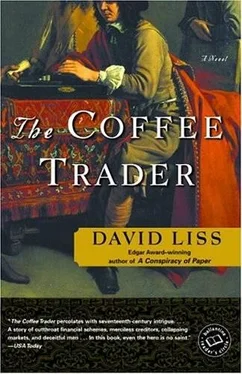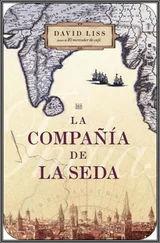There were perhaps a dozen or so other people on the long bright-red boat, drawn steadily along by a team of horses that clopped along the side of the canal. It was of a flat design, more like a raft than a boat, but it was sturdy and included a hutlike structure in the center where passengers might take shelter during the rains. Miguel had been on larger horse-drawn boats, some so large that a tap man sold the passengers beer and pastries, but this conveyance was too small for such amenities.
Miguel paid the other travelers no mind; he hid from the mist in the muted light of the enclosed area and attempted to distract himself from his bladder with a tale of Charming Pieter. It was one he had read many times, concerning the cruel owners of a country estate who had robbed their tenants of their crops. Pieter and Mary pretend to be regents interested in purchasing the land, and once they gain the owners’ trust, they rob them in the night, stopping on their way out of the village to return to the peasants what belongs to them.
Miguel had already looked through his pamphlet twice by the time the boat arrived, and he wasted no time finding a private spot to take care of his pressing concerns. Once relieved of distractions, he felt free to take in the city. In many ways, Rotterdam was like a smaller, neater version of Amsterdam. He had visited there often enough to know how to navigate its streets, and he found the tavern Fernando had specified with little difficulty. There, he and his friend met and discussed the particulars of Fernando’s duties in London ’s exchange. Fernando seemed puzzled by Miguel’s insistence that the trades take place at a particular time, but he agreed nonetheless, once Miguel assured him that nothing he did would in any way bring suspicion upon him or the fragile community of Jews in London.
It grew late by the time they had finished, and Miguel accepted Fernando’s offer to remain in Rotterdam, where he attended evening prayers at the small synagogue and then took the morning boat to Amsterdam. He settled into his wooden bench on the boat and closed his eyes, thinking of what tasks remained to him before he could consider the coffee-fruit scheme in hand. In the cool of the morning he fell asleep, he knew not how long, and awoke from a hazy dream with a loud mutter. Embarrassed, he looked around to see who had heard him. A quick glance told him he recognized no one, and he almost turned back to his thoughts before something caught his eye. He looked again. In the back of the boat, quietly engaged in private conversation, he saw a pair of finely dressed gentlemen. Miguel dared take only a passing glance, but it was enough for him to see they wore beards. True, they were cut very short, but beards all the same. One man was particularly dark, and his closely shorn facial hair crept like a black fungus halfway down his throat. Any Dutchman would shave such a thing away. The only man who would wear his beard thus was a Jew-one trying hard not to look Jewish.
There could be no mistake about it. These were Ma’amad spies.
When the boat reached Amsterdam, Miguel walked a short distance out of his way to see if the two men would follow him, but after huddling together in a brief meeting of bobbing heads they both walked off toward the Exchange. Miguel stood for a few minutes by the canal and gazed at the overcast sky before buying a pear from an old woman with a pushcart. It tasted mealy, like parsley root, and after one bite he threw it down on the road. The woman urged her wobbling cart along, determined not to notice Miguel’s displeasure, while two filthy boys lunged for the remains. Rolling the taste of bad pear around in his mouth for a moment, Miguel decided that the day was too far gone for there to be much to do on the Exchange, so he headed home.
The spies had disordered him, and he kept turning around, searching for signs of treachery in beggars and servants and burghers as they strolled along the streets. This is no way to live, he told himself; he could not spend his days jumping at every shadow. But just when he had convinced himself to be calm, he crossed the bridge into the Vlooyenburg and saw Hannah in the middle of the street-despite the veil, Miguel recognized her instantly-and, alongside her, Annetje. And Joachim Waagenaar.
Joachim had backed them into a corner. There was nothing threatening in his gestures, and he appeared calm. A passing stranger might not have noticed anything odd-although it would have been unusual for a veiled woman to speak casually with so low a man.
Annetje saw Miguel first. Her face brightened and she sucked in her breath; her bosoms heaved in the pretty blue bodice that matched her handsome cap.
“Oh, Senhor Lienzo!” she exclaimed. “Save us from this madman!”
Miguel answered in Portuguese, addressing Hannah. “Has he harmed you?”
Speechless, she shook her head no.
Then the stench hit him. The wind must have shifted, for the smell drifted in his direction. Miguel felt himself overwhelmed. The Dutch were a fastidiously, even recklessly, clean people, washing themselves far more frequently than was healthy for the body. Joachim had clearly abandoned the practice; he smelled more foul than the least washed Portuguese peasant. It was more than odors of the body, too, but smells of urine and vomit and-it took Miguel an instant-rotted meat. How does a man smell of rotted meat?
He shook his head, trying to break the numbing effect of the stench. “Hurry home,” he told Hannah. “Speak of this to no one. And keep the girl quiet.” They began to ease away from Joachim. “Be sure she knows to hold her tongue,” he said to Hannah, “or I’ll turn her out.”
He turned to Joachim. “Step back.”
To Miguel’s relief, he did so. The women slipped past him, pressing their backs against the wall to increase as much as they could the distance between themselves and the Dutchman. As soon as they had cleared him, they hurried into a brisk walk.
“Let’s go,” Miguel demanded. “Across the bridge. Now.”
Again Joachim obeyed, like a servant who has been caught by his master at something naughty. Miguel looked around to see if anyone he knew had witnessed the encounter and muttered a prayer in thanks to the Holy One, blessed be He, that the spies had not followed him home and that this disaster had happened during the hours of the Exchange, when any man who might wish him ill was off attending to business.
Once they had crossed the bridge over the Houtgracht, Miguel led Joachim to a little thicket of trees by the canal where they could speak unobserved.
“Have you nothing left of your former self? How dare you approach my brother’s wife?” Miguel shifted his position to put himself downwind of Joachim, lessening the stench a bit.
Joachim hardly looked at him. Instead he watched a duck that pecked at the ground near their feet, oblivious to the two men. “Why do you go on about your brother’s wife? I approached your whore too, don’t forget,” he said. “She is a luscious one, senhor. Do you think she’d have me? She seems to me the sort who’d take to just about anyone.”
Miguel sucked in a breath. “Don’t let me see you bother anyone of my family again. Don’t let me see you in the Vlooyenburg.”
As if he had never existed, the soft-spoken compliant Joachim was replaced by the angry one. “Or what should happen? Tell me what you will do, senhor, if you find me upon your streets, talking with your neighbors, telling tales. Tell me, what will you do?”
Miguel let out a sigh. “Surely you want something. You didn’t come to the Vlooyenburg because you have nothing better to do with your time.”
“As it happens, I have nothing better to do with my time. I have proposed that we engage together in some business or other, but you’ve rejected my proposals and made sport of me.”
Читать дальше












